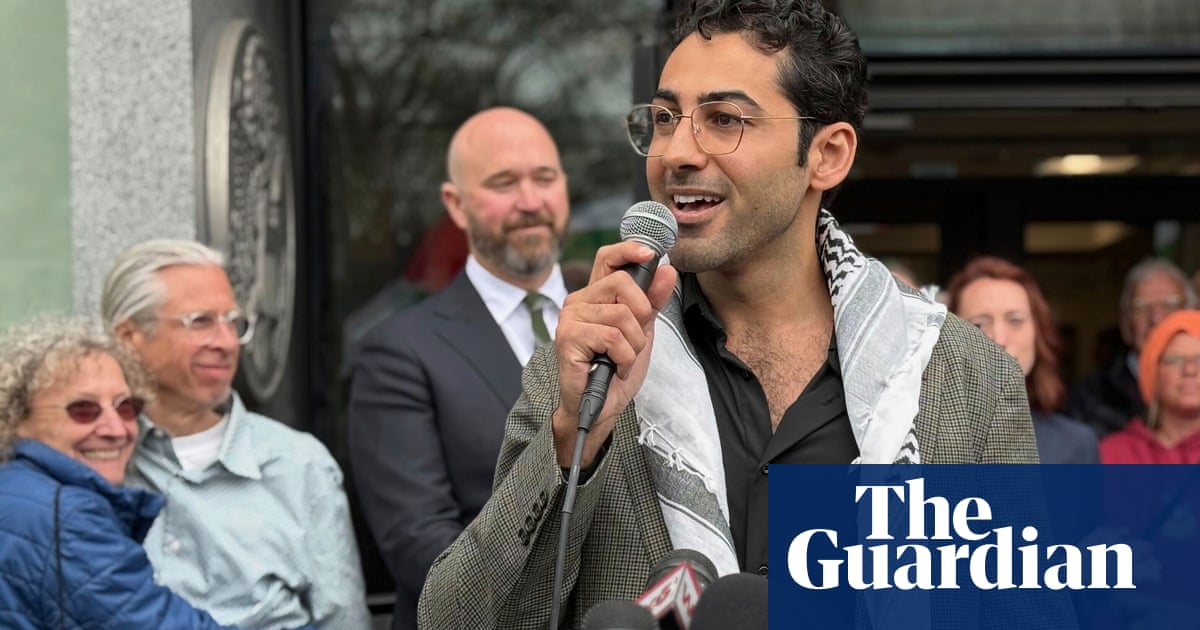Mohsen Mahdawi, the Palestinian green-card holder andColumbia Universitystudentfreedon Wednesday after more than two weeks in immigration detention, has issued a stark warning about the US’s descent into authoritarianism.
“Once the repression of dissent, in the name of security, becomes a key objective of a government, authoritarian rule and even martial law are not far off. When they look at my case, all Americans should ask themselves: what is left of our democracy, and who will be targeted next?” saidMahddawi in an op-ed for the New York Times.
Mahdawi, a Palestinian human rights advocate based in Vermont, was detained and ordered deported by theTrump administrationon 14 April despite not being prosecuted of any crime – and without due process. The philosophy student wasarrested by masked Iceagents in Colchester,Vermont, during what should have been his citizenship naturalization interview.
He is amonga growing number of international studentswho have been ordered deported for their Palestinian rights advocacy by the Trump administration, which is using an obscure law to accuse these individuals of posing a threat to US foreign policy interests. Unlike the others, Mahdawi avoided being sent to a Louisiana detention facility after the Ice agents narrowly missed the flight, allowing his attorneys to challenge the deportation order in Vermont.
“Despite spending 16 nights in a jail cell, I never lost hope in the inevitability of justice and the principles of democracy. I wanted to become a citizen of this country because I believe in the principles that it enshrines,” writes Mahdawi.
“The American government accuses me of undermining US foreign policy, a patently absurd pretext for deportation for political speech that theTrump administrationdislikes. The government is scraping the bottom of the barrel in its attempts to smear me. My only ‘crime’ is refusing to accept the slaughter of Palestinians, opposing war and promoting peace. I have simply insisted that international law must be respected. I believe the way to a just and long-lasting peace for Palestinians and Israelis is through diplomacy and restorative justice.”
Mahdawi was born and raised in a refugee camp in the occupiedWest Bank, where as a child he bore witness to the death of his brother after he was denied access to medical care, and the detention and imprisonment of multiple close relatives including his grandfather and father by Israeli forces.
Moving to the US in 2014 was his first experience of freedom, he said.
“Ultimately, I sought American citizenship not only because I did not want to lose the freedom I enjoyed as a permanent resident but even more so because I believe in the principles and values of democracy, which this country stipulates in its founding documents,” he wrote in the Times.
“These very freedoms are under attack today, both for me and for others like me. The Trump administration is hewing to Israel’s playbook: Under the thinly veiled guise of security, rights are being denied and due process eliminated.
Sign up toThis Week in Trumpland
A deep dive into the policies, controversies and oddities surrounding the Trump administration
after newsletter promotion
“By seeking to deport me, the Trump administration is sending a clear message: There is no room for dissent, free speech be damned. It seems willing to shield an extremist Israeli government from criticism at the expense of constitutional rights, all while suppressing the possibility of a peaceful future for both Palestinians and Israelis, a future free of trauma and fear.”
Israel’s war onGazasince the 7 October 2023 Hamas attack has killed at least 52,000 Palestinians, mostly women and children, according to Palestinian health authorities. Thousands more people are missing and feared dead, while tens of thousands have suffered injuries and preventable diseases including acute malnutrition.
In the ruling ordering Mahdawi’s release on bail on Wednesday, Judge Geoffrey W Crawford wrote: “Legal residents not charged with crimes or misconduct are being arrested and threatened with deportation for stating their views on the political issues of the day.” He likened the Trump administration’s crackdown on students and free speech to the red scare and the McCarthy era.
Upon his release, Mahdawi toldsupporters and the media: “I am saying it clear and loud. To President Trump and his cabinet: I am not afraid of you.”
